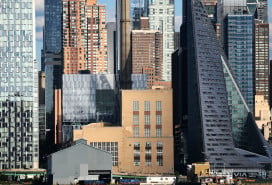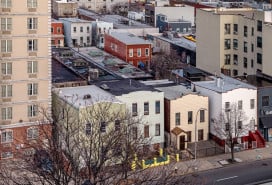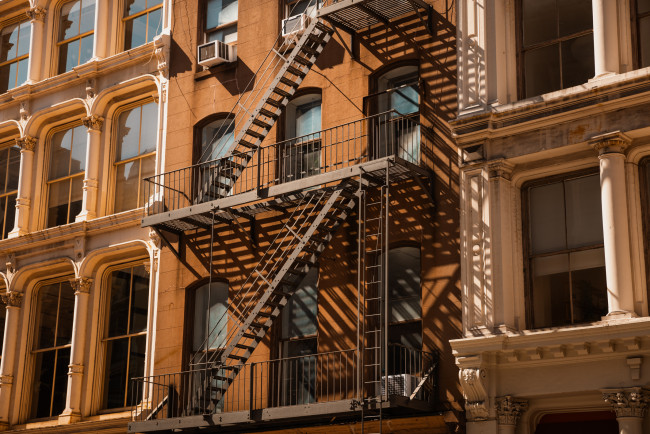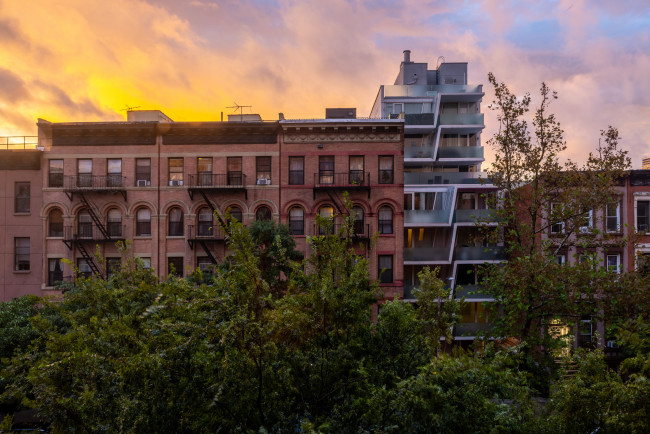New Rent Guidelines Board report justifies a rent freeze, tenant advocates claim
- The RGB study found revenues increased 12.1 percent for landlords of rent-stabilized units
- A group of owners disputes the findings and argues most regulated buildings are distressed

The report “shows that a rent freeze is necessary and more than justified,” said Cea Weaver of the New York State Tenant Bloc.
iStock
The annual fight over rent-stabilized leases has begun with a report from the Rent Guidelines Board that puts landlords on the defensive.
According to the new report, which was released yesterday, revenues increased 12.1 percent for landlords of buildings with any rent-stabilized units in New York City, findings which tenant advocates said justify a rent freeze.
The RGB determines adjustments in rents each year for over 2.4 million rent-stabilized tenants in NYC. The board presented the 2025 Income and Expenses Study at a Thursday hearing, the first meeting in a series of public hearings to set any increases for leases commencing or being renewed on or after October 1st, 2025, and on or before September 30th, 2026.
The report found that between 2022 and 2023, the most recent data set available, net operating income (NOI), the revenue remaining after operating costs are paid, increased 12.1 percent for buildings with rent-stabilized units, an increase of about 2 percent over the previous year. After adjusting for inflation, NOI rose 8 percent.
The increase in NOI was the greatest in the core part of Manhattan, where it rose 23.1 percent. Growth was smaller in the rest of Manhattan, as well as the outer boroughs.
Calls for a rent freeze
The report “shows that a rent freeze is necessary and more than justified,” Cea Weaver, director of the New York State Tenant Bloc, a new organization to support pro-tenant candidates, said in a statement to the media. “While one in four New Yorkers is struggling to afford groceries and housing, landlords’ income is rising.”
In light of the report, not implementing a rent freeze would be “a direct attack on the stability of millions of New Yorkers who make this city what it is,” Joanne Grell, rent stabilized tenant in the South Bronx and co-chair of the Freeze the Rent Campaign, said in a statement.
Response from landlords
The New York Apartment Association, a coalition of property owners and managers, said the report failed to highlight the severe distress in most regulated buildings. The group said that the data shows the majority of rent-stabilized buildings saw a decline in inflation-adjusted net operating income.
The group said its analysis of the report shows that buildings built before 1974 outside the core of Manhattan make up 65 percent of the surveyed data. For this group, the inflation-adjusted NOI declined by 2 percent.
“The vast majority of rent-stabilized apartments are in the outer borough buildings,” said Kenny Burgos, CEO of the New York Apartment Association.
“The data clearly shows disinvestment in these buildings from 2022 to 2023, which should alarm everyone. Furthermore, the report fails to factor in the massive spike in inflation in 2023 when it calculates NOI for this key group,” he said in a statement posted to Substack.
Questioning the distressed buildings tally
According to the Income and Expense Study: “For the first time since 2016, [the] number of buildings in distress (defined as negative NOI) declined, with 9.3 percent of all buildings with at least one rent-stabilized unit in distress.
[Editor's note: After publication, a spokesperson for The New York Apartment Association followed up to say that the distressed buildings calculation was "misleading" and that the number of distressed buildings appears to have increased.
"In 2023, the government started requiring that (Real Property Income and Expense) statements be filed for buildings with less than 11 units that had commercial space. This led to the sample size increasing by 1,500 buildings, which changed the percentage, even though the actual number of distressed buildings increased," said Michael G. Johnson, communications director.]
Key issue in the race for mayor
The nine-person board is appointed by the mayor and under Mayor Eric Adams, the RGB has raised rents on NYC rent-stabilized tenants three years in a row. During the de Blasio administration, it froze rents three times.
The board will announce its final decision regarding rent adjustments in June.
Freezing the rent for stabilized tenants has become an issue in the campaign for NYC mayor and NYS Tenant Bloc has launched a campaign to organize 20,000 tenant voters to vote only for mayoral candidates who will freeze the rent.
“We want NYC's next mayor to hear us loud and clear: the time for a four-year rent freeze is now," said Sasha Wijeyeratne, executive director of CAAAV Voice, which organizes working-class Asian immigrants in Chinatown and Astoria
Three mayoral candidates have fully committed to freezing the rent if elected mayor: Assembly member Zohran Mamdani, State Senator Jessica Ramos, and former Assembly member Michael Blake. A fourth, Comptroller Brad Lander, said he will support a rent freeze if the data supports it.
Another mayoral candidate, former New York City Comptroller Scott Stringer, told Brick he supported rent freezes in the past “but I’m not going to support a blanket freeze without looking at data and analysis.”
A rent freeze would be for 2026
As Brick previously reported, enacting a rent freeze requires several steps, so stabilized tenants could not see their rent frozen before October 2026.
That’s because a new mayor wouldn’t be able to appoint members to the nine-person board until they take office in January 2026.
The first RGB vote on rent adjustments would occur over the following summer. Any rent increases or freeze would go into effect for leases being renewed and vacancies occurring on or after Oct. 1st, 2026 through Sept. 30th, 2027.
You Might Also Like




























